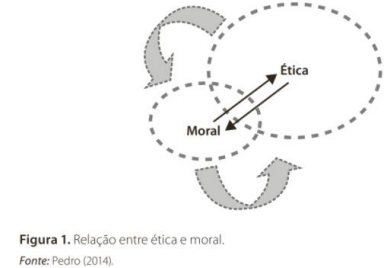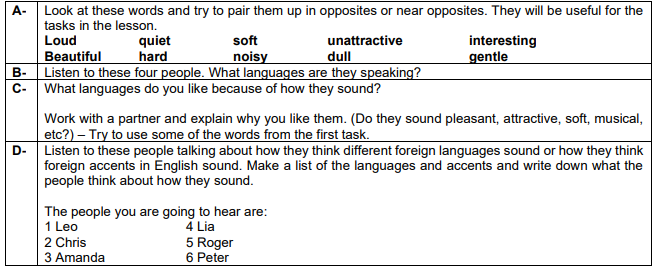Questões de Concurso Público FURB - SC 2020 para Instrutor de Idiomas - Inglês
Foram encontradas 20 questões
I- O verbo “IR” está conjugado na terceira pessoa do singular do pretérito perfeito do indicativo: “foi”. II- São exemplos de verbos irregulares utilizados na notícia: “ESTAR”, “SER”, “TER”. III- “Aberta”, um exemplo de verbo abundante, é o particípio passado regular do verbo “ABRIR”.
É correto o que se afirma em:
( ) Em “...sem contar milhares de seguidores dos formandos...”, a palavra “milhares” é um numeral masculino que está indicando a quantidade exata que é correspondente a dez centenas ou mil unidades. ( ) Em “A sessão solene presidida...”, a palavra “sessão” é um exemplo de palavra homônima, que tem como significados “partes de obra literária e de artigo científico, repartições públicas, setores de instituições privadas, subdivisões de um estabelecimento comercial, entre outros.”. ( ) Em “...em seus perfis pessoais.”, a palavra, no singular, é “perfil”, portanto um substantivo masculino terminado em il, cujo plural se faz mudando o “l” em “s”.
Assinale a alternativa com a sequência correta:
É correto o que se afirma em:
Analise a figura a seguir:

A imagem expressa que:
I- Um equilíbrio entre ética e moral é algo prescindível.
II- Há um movimento intrínseco entre ética e moral.
III- Pode-se tratar ética e moral como antônimos.
É correto o que se afirma em:
Acerca da ética, afirma-se:
I- A perspectiva ética não necessita ser coerente com o dever moral.
II- A vida ética é o acordo e a harmonia entre a vontade subjetiva individual e a vontade objetiva cultural.
III- O dever é o acordo pleno entre a vontade individual e a totalidade ética e moral.
É correto o que se afirma em:
SEQUENCE OF COURSEBOOK ACTIVITIES:


Uses of coursebook materials:
( ) Involves speaking practice ( ) practices note-taking skills ( ) pre-teaches vocabulary ( ) develops listening for detail ( ) personalizes the topic ( ) brainstorms ideas about the topic ( ) introduces the theme of the lesson ( ) provides language needed to do the activities
The correct sequence is:
Match the examples of teacher’s classroom language with their functions:
Function
A- checking understanding
B- emphasising word stress
C- drilling
D- nominating
E- monitoring
F- eliciting
G- organizing pairwork
Teacher’s classroom language
( ) Listen, I like playing football, repeat everyone, I like playing football.
( ) Maria – collect the books, please.
( ) Tell me three adjectives beginning with the letter “C”.
( ) Just listen to how I say it – poTAtoes.
( ) Okay, discuss it with your partner now, please.
( ) I’m really full, I’ve just eaten a big lunch. Am I hungry now?
( ) Let’s have a look. Yes, that’s great. Now try the next one.
The correct sequence is:
Match the teacher’s purposes for using students’ first language:
I- Asking students to show they know what to do for homework = used for checking understanding
II- Giving individual written feedback to a weak student = used for explaining procedures
III- Telling a large group of teenagers the rules of a game = used for motivating
IV- Encouraging elementary students to try new ways of learning = used for motivating
Check the correct answer:
late – player – party – alphabet – island – hard – pizza – grandson – invitation
1. /æ/ 2. /ei/ 3. /ɑ:/ 4. /ə/
The words below include examples of which lexical or phonological items?
✓ unhappy and incorrect
✓ hole and whole
✓ vehicle: car, bicycle
✓ fit and feet
Read the text below and decide which option best fits each gap:
Planetary Artistry
By Johanna Kieniewicz
Nonetheless, I suspect that the image of definitely water-lain __________ made the heart of more than one geologist __________ a beat. Ground truth. You could argue that the scientific exploration of the extra-terrestrial is, at least __________ part, a search for meaning: to position us within a larger cosmology. But our fascination with, and connection to, what we see in the night sky comes not just through science, but also through art. So it should come as no surprise that scientific images of planetary surfaces have __________ inspiration to a range of artists from Galileo - whose first sketches of the moon through a telescope are __________ beautiful - to Barbara Hepworth - whose interpretations of the lunar surface are far less literal. Source and full text: http://blogs.plos.org/attheinterface/2012/10/04/planetary-artistry/
The correct sequence is:
The text below is the introduction from a book on sports.
SPORTSWRITING
Offices and bars are full of casual obscenity, but most British newspapers are ... well, not necessarily careful about language, but careful about bad words anyway. The phrase 'family newspaper' is an ineluctable part of our lives. Newspapers are not in the business of giving gratuitous offence. It is a limitation of newspaper writing, and one everybody in the business, whether writing or reading, understands and accepts. There are many other necessary limitations, and most of these concern time and space.
Newspapers have dominated sportswriting in Britain for years, and have produced their own totem figures and doyens. But ten years ago, a new player entered the game. This was the phenomenon of men's magazines; monthly magazines for men that had actual words in them - words for actually reading. GQ was the pioneer and, in my totally unbiased opinion as the long-term author of the magazine's sports column, it leads the way still, leaving the rest panting distantly in its wake.
Sport, is of course, a blindingly obvious subject for a men's magazine - but it could not be tacked in a blindingly obvious way. Certainly, one of the first things GQ was able to offer was a new way of writing about sport, but this was not so much a cunning plan as a necessity. The magazine was doomed, as it were, to offer a whole new range of freedoms to its sportwriters. Heady and rather alarming freedoms. Freedom of vocabulary was simply the most obvious one and, inevitably, it appealed to the schoolboy within us. But space and time were the others, and these possibilities meant that the craft of sportswriting had to be reinvented.
Unlike newspapers, a magazine can offer a decent length of time to research and to write. These are, you would think, luxuries - especially to those of us who are often required to read an 800-word match report over the telephone the instant the final whistle has gone. Such a discipline is nerve-racking, but as long as you can get it done at all, you have done a good job. No one expects a masterpiece under such circumstances. In some ways the ferocious restrictions make the job easier. But a long magazine deadline gives you the disconcerting and agoraphobic freedom to research, to write, to think.
To write a piece for a newspaper, at about a quarter of the massive GQ length, you require a single thought. The best method is to find a really good idea, and then to pursue it remorselessly to the end, where ideally you make a nice joke and bale out stylishly. If it is an interview piece, you look for a few good quotes, and if you get them, that's your piece written for you. For a longer piece, you must seek the non-obvious. This is a good quality in the best of newspaper writing, but an absolute essential for any writer who hopes to complete the terrifying amount of words that GQ requires. If you write for GQ you are condemned to try and join the best. There is no other way.
GQ is not restricted by the same conventions of reader expectation as a newspaper. You need not worry about offending people or alienating them; the whole ethos of the magazine is that readers are there to be challenged. There will be readers who would find some of its pieces offensive or even impossible in a newspaper, or even in a different magazine. But the same readers will read the piece in GQ and find it enthralling.
That is because the magazine is always slightly uncomfortable to be with. It is not like a cosy member of the family, nor even like a friend. It is the strong, self-opinionated person that you can never quite make up your mind whether you like or not. You admire him, but you are slightly uneasy with him. The people around him might not altogether approve of everything he says; some might not care for him at all. But they feel compelled to listen. The self-confidence is too compelling. And just when you think he is beginning to become rather a bore, he surprises you with his genuine intelligence. He makes a broad joke, and then suddenly he is demanding you follow him in the turning of an intellectual somersault.
Source: Adapted from (Pre-2013 Revision) CPE Handbook.
Choose the correct alternative that provides the correct answer for the question: Why were sportswriters for
GQ given new freedoms?
1 You can get 2.2% __________ on your savings at our bank. 2 I couldn't buy the house because the bank refused to give me a __________. 3 We __________ a twenty-year mortgage on the house. 4 We __________ our mortgage last year, so we have no debts now. 5 I couldn't afford to buy the car, so I got a small __________ from the bank. 6 We paid 4% interest __________ the loan.
What is the best option?